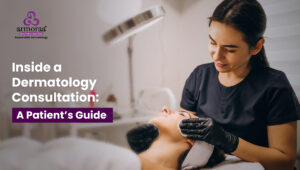Introduction
We’ve all heard the saying, “A good night’s sleep can work wonders,” and it couldn’t be truer when it comes to the health of our hair. Premature greying, or the appearance of grey hair before the age of 30, is a concern for many people. While genetics play a significant role in the greying process, emerging research suggests a connection between premature greying and disrupted sleep patterns. In this blog post, we’ll explore this intriguing relationship and understand how taking care of your sleep can potentially delay those unwanted grey strands.
What causes hair to turn grey earlier than expected?
Genetics: The most significant factor behind premature greying is your genetic makeup. If your parents or grandparents experienced premature greying, you might be more likely to as well.
Melanin Depletion: Hair color is determined by the presence of a pigment called melanin. As we age, our bodies produce less melanin, leading to the gradual loss of color in our hair.
Stress and Lifestyle: High-stress levels and an unhealthy lifestyle can accelerate the depletion of melanin and lead to premature greying.
The Connection Between Sleep Patterns and Greying
Recent studies have revealed that irregular or inadequate sleep patterns can contribute to premature greying. Here are some ways in which sleep and greying are linked:
Oxidative Stress: Sleep deficiency can lead to increased oxidative stress in the body, which, in turn, can damage melanocytes, the cells responsible for producing melanin. This damage can expedite the greying process.
Melatonin Production: Melatonin, a hormone that regulates sleep and wake cycles, may also play a role in hair color. Disrupted sleep patterns can disturb melatonin production, affecting the balance of melanin in the hair follicles.
Inflammatory Response: Poor sleep can trigger an inflammatory response in the body, potentially affecting the hair follicles and contributing to greying.
DNA Damage: Sleep deprivation has been associated with increased DNA damage. Hair cells are not exempt from this damage, and when they lose their ability to repair themselves, grey hairs can appear.
5 Tips for Healthy Sleep and Hair:
1.Prioritize Sleep: Aim for 7-9 hours of quality sleep each night to ensure your body has enough time to repair and regenerate.
2.Manage Stress: Practice stress-reduction techniques like meditation, yoga, or deep breathing exercises to keep stress levels in check.
3.Balanced Diet: Consume a diet rich in antioxidants, vitamins, and minerals, as they can help counteract oxidative stress and support hair health.
4.Stay Hydrated: Proper hydration is essential for overall health, including the health of your hair.
5.Regular Exercise: Engage in regular physical activity, which can help you sleep better and manage stress.
Maintain a Consistent Sleep Schedule: Try to go to bed and wake up at the same time every day to regulate your body’s internal clock.
Conclusion:
While the connection between premature greying and sleep patterns is complex and not fully understood, there is growing evidence to suggest that maintaining healthy sleep habits can positively impact the aging of your hair. By prioritizing a good night’s sleep, managing stress, and adopting a healthy lifestyle, you can take proactive steps to keep those grey hairs at bay for a little longer. Remember that genetics still play a significant role, but a well-rested body is better equipped to handle the natural aging process. So, sleep tight and keep those grey hairs at bay!




